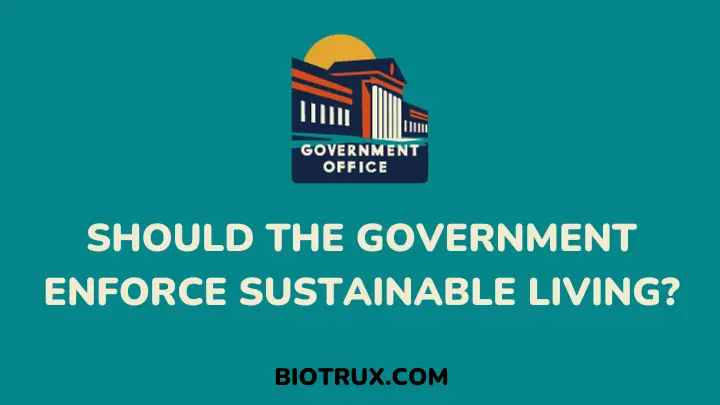Welcome to a world where sustainable living is no longer a choice but a necessity. With various environmental issues knocking at our doors, it’s time for the government to enforce sustainable living.
This way, we can have a collective responsibility to advocate for a harmonious coexistence between humanity and nature. this article will delve into why the government should enforce sustainable living and why it’s our collective responsibility to advocate for it.
Discover the intricacies of a movement that aims to achieve a harmonious coexistence between humanity and the environment through eco-friendly practices and tackling challenges head-on.
It’s time to discover how we can work with the government to create a better, more sustainable world for ourselves and future generations.
The Urgency of Sustainable Living
The global call for sustainable living has never been more urgent. Governments play a pivotal role in steering society toward a more eco-friendly path by virtue of their authority and influence. As societal stewards, a government can enact and enforce policies that drive sustainable living and practices.
They can institute regulations that curb environmental degradation, incentivize green technologies, and set emission standards. Moreover, governments can invest in eco-friendly infrastructure, fostering a sustainable framework for future generations.
Governments act as a push for change. They set the tone for environmental responsibility and create a conducive environment for businesses and individuals to adopt sustainable practices.
In essence, their regulatory and strategic interventions are instrumental in addressing environmental challenges and propelling society toward a greener, more sustainable future.
Why Should the Government Enforce Sustainable Living?
Addressing the tragedy of the commons
The Tragedy of the Commons, as described by the ecologist Garrett Hardin, underscores the peril when shared resources are exploited without restraint.
In the context of sustainable living, this tragedy unfolds when individuals, driven by self-interest, deplete common environmental resources. Without government intervention, unregulated activities like overfishing, deforestation, and excessive carbon emissions can lead to irreversible ecological damage.
For instance, studies reveal that uncontrolled fishing has depleted global fish stocks by 90% since 1950. Additionally, rampant deforestation, largely unaddressed, contributes to 12 to 20% of global greenhouse gas emissions.
The government must enforce sustainable living practices to avert the tragedy of the commons and safeguard our shared environment. These practices ensure the responsible use of resources for the collective benefit of society.
Economic externalities and the need for internalization
Unsustainable practices often carry hidden costs, known as economic externalities, impacting communities and the environment. From air pollution to resource depletion, the true toll of these actions isn’t reflected in market prices.
Governments, however, play a crucial role in internalizing these externalities by implementing policies that make businesses accountable for their environmental impact. For example, the World Health Organization estimates that air pollution-related illnesses cost global economies $8.1 trillion in 2019.
When the government enforces regulations and incentives for sustainable living, it can shift the burden of these hidden costs back to the polluters. This fosters sustainable living and ensures that the true price of environmental degradation is considered, creating a more equitable and responsible economic framework.
Ways A Government Can Enforce Sustainable Living

1. Implementing eco-friendly policies
One effective way for a government to enforce sustainable living is through developing and enforcing eco-friendly policies. Governments can spearhead sustainable living by championing eco-friendly practices.
By crafting policies and aligning them with environmental goals, governments can influence the behavior of industries and citizens alike. Notably, countries investing in renewables witness positive economic outcomes, with each dollar spent on clean energy generating three times more jobs than traditional sectors.
Government-led initiatives in eco-friendly practices mitigate environmental impact and foster innovation and economic growth. Positioning sustainable living as a pragmatic and advantageous choice for the planet and its inhabitants.
2. Investing in green infrastructure
Governments wield transformative power by investing in green infrastructure, a cornerstone of enforcing sustainable living.
Allocating funds to sustainable transportation, renewable energy, and eco-friendly urban planning curtails environmental degradation and stimulates economic growth. By prioritizing sustainable initiatives, governments mitigate climate impact and foster resilient communities.
This underscores their crucial role in steering societies towards a more sustainable and environmentally conscious future.
3. Educational campaigns
A key component of sustainable living is awareness. Governments can initiate educational campaigns even in rural areas to inform citizens about the environmental impact of their choices and the benefits of adopting sustainable practices.
These campaigns can be conducted through various channels, including schools, media, and online platforms, fostering a culture of environmental responsibility.
4. Incentivizing sustainable living practices
Governments can drive innovation and adoption of sustainable technologies by incentivizing businesses and individuals.
This could involve tax credits for companies investing in eco-friendly practices, incentives for homes with solar energy, and grants for research and development in green technologies.
Governments can accelerate the transition to environmentally friendly alternatives by making sustainable options more economically attractive.
5. Setting emission standards
A government can enforce sustainable living by setting stringent emission standards. By regulating industries and vehicles, they mitigate air pollution and curb greenhouse gas emissions.
For instance, introducing emission standards in the U.S. has significantly reduced pollutants, preventing several health-related issues. These standards safeguard public health and encourage industries to adopt cleaner technologies, fostering a sustainable trajectory.
Governments become custodians of the environment through decisive regulatory measures, guiding societies toward a more sustainable future.
6. Instituting regulations that curb environmental degradation
Governments play a pivotal role in enforcing sustainable living by instituting regulations that combat environmental degradation. Stricter policies on waste management and disposal and land use, for instance, are vital tools in preserving ecosystems.
Implementing such regulations has been proven effective in curbing deforestation rates, with countries adopting stringent forestry laws experiencing significantly lower deforestation rates.
Governments become architects of a sustainable future by acting as stewards of the environment through comprehensive regulations. They also safeguard natural resources and promote a harmonious coexistence between human activities and the planet.
7. Fostering a sustainable framework for future generations
Governments contribute to sustainable living by nurturing a framework that ensures the well-being of future generations. Investments in renewable energy and conservation efforts today lay the foundation for a greener tomorrow.
Sustainable policies lead to reduced ecological footprints and improved quality of life for citizens in countries that adopt them. By prioritizing sustainable practices, governments become custodians of the planet, leaving a legacy of environmental stewardship for generations to come.
This forward-thinking approach ensures that the actions taken today resonate positively for the well-being and prosperity of those who inherit the Earth.
Challenges and Criticisms
While the push for sustainable living is imperative, the government’s role in enforcement faces substantial challenges and criticism.
1. Balancing economic growth and environmental conservation
Achieving harmony between economic growth and environmental conservation poses a delicate challenge.
Striking this balance is crucial, as studies show that stringent environmental regulations must be carefully calibrated to maintain economic development.
A subtle approach is essential to ensure sustainable practices without compromising economic prosperity.
2. Potential drawbacks of over-regulation
Some people who analyze and offer opinions on various topics believe that the government’s involvement in regulation can have unexpected negative effects on the economy. This can happen by stifling innovation and competitiveness.
Therefore, it is essential to establish a reasonable and well-thought-out regulatory framework that encourages environmentally friendly practices without hampering the growth and progress of industries.
3. Ensuring equitable distribution of the burden
The burden of sustainability should be distributed equitably to prevent marginalized communities from disproportionately shouldering the costs. Research indicates that poorly designed environmental policies can exacerbate social inequalities.
Governments must, therefore, ensure that the transition to sustainable living is inclusive and just. Addressing these challenges requires a nuanced and adaptive approach, acknowledging the complexities of the quest for a sustainable future.
As governments navigate these criticisms, they must strive for a balance that fosters environmental well-being without compromising the broader socio-economic landscape.
FAQs
Why is corporate responsibility essential for sustainable living?
Corporate responsibility ensures that businesses operate ethically and sustainably. Governments can encourage this by creating policies that reward responsible practices and penalize environmental negligence.
How can citizens contribute to sustainable living under government enforcement?
Citizens can contribute by adopting eco-friendly habits, supporting sustainable businesses, and actively participating in government-led initiatives. Small lifestyle changes collectively make a significant impact.
Is international collaboration crucial for sustainable living efforts?
Yes. Environmental issues are global, and collaboration between governments is vital. Shared knowledge, resources, and coordinated efforts on an international scale can address challenges that transcend national borders.
Can sustainable living policies positively impact the economy?
Yes. Sustainable living policies can have a positive economic impact. By fostering innovation, creating green jobs, and reducing long-term environmental costs, these policies contribute to a more robust and sustainable economy.
Are there successful examples of countries where sustainable living thrives due to government enforcement?
Yes. Countries like Sweden and New Zealand showcase successful models where government policies have significantly contributed to sustainable living.
Wrapping Up
This is an important point to remember as I conclude this discussion on whether the government should enforce sustainable living. What we choose today will determine the world we leave for future generations.
The health of our planet is inextricably linked to our own well-being, so we must avoid prioritizing short-term gains over long-term sustainability.
By working together and making conscious choices, we can create a world that is not only sustainable but also equitable and just. So, let’s take action today to build a better tomorrow and ensure our planet thrives for generations.
As an individual, you can also learn how to live a sustainable lifestyle on a budget. Individuals’ and government’s combined efforts can quickly drive the necessary change.
Thanks for reading.

